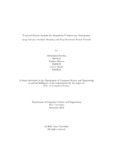| dc.contributor.advisor | Alam, Md. Golam Rabiul | |
| dc.contributor.author | Rayhan, Mohammad | |
| dc.contributor.author | Sultana, Samiha | |
| dc.contributor.author | Majid, Annur | |
| dc.date.accessioned | 2020-10-14T05:03:54Z | |
| dc.date.available | 2020-10-14T05:03:54Z | |
| dc.date.copyright | 2019 | |
| dc.date.issued | 2019-12 | |
| dc.identifier.other | ID: 16101117 | |
| dc.identifier.other | ID: 16301076 | |
| dc.identifier.other | ID: 16101038 | |
| dc.identifier.uri | http://hdl.handle.net/10361/14060 | |
| dc.description | This thesis is submitted in partial fulfillment of the requirements for the degree of Bachelor of Science in Computer Science, 2019. | en_US |
| dc.description | Cataloged from PDF version of thesis. | |
| dc.description | Includes bibliographical references (pages 41-43). | |
| dc.description.abstract | This study shows importance hierarchy of financial factors of corporations’ Goodwill
and tries to foresee with popular machine learning and deep learning models. Financial engineering is using mathematical model to study financial behavior. Financial
engineers are hired by investment banks, commercial banks, hedge funds, insurance
companies, corporate treasuries, and regulatory agencies. It is vital for each of
them to asses a company’s sustainability before any sort of investment. However,
predicting sustainability is not deterministic. Therefore, corporate sustainability
has become a mainstream business goal for stakeholders. Whether Quantitative
finance impacts goodwill or has implicit insight can be a machine learning problem. Deep learning and machine learning are rapidly changing the financial services
industry. Business leaders can now transform vast amounts of financial data into
insightful predictions with the help of data science, creating significant savings in
the bottom line. This thesis is concerned with investigating financial factors of a
company’s Goodwill and also fits popular machine learning and deep learning models and evaluate goodness of fit. To aid the research, a comparison between the
proposed models-XGboost and Deep LSTM are conducted. | en_US |
| dc.description.statementofresponsibility | Mohammad Rayhan | |
| dc.description.statementofresponsibility | Samiha Sultana | |
| dc.description.statementofresponsibility | Annur Majid | |
| dc.format.extent | 47 pages | |
| dc.language.iso | en_US | en_US |
| dc.publisher | Brac University | en_US |
| dc.rights | Brac University theses are protected by copyright. They may be viewed from this source for any purpose, but reproduction or distribution in any format is prohibited without written permission. | |
| dc.subject | Financial factors | en_US |
| dc.subject | Deep learning | en_US |
| dc.subject | XGBoost | en_US |
| dc.subject | Machine learning | en_US |
| dc.title | Financial factors analysis for acquisition premium and anticipation using extreme gradient boosting and deep recurrent neural network | en_US |
| dc.type | Thesis | en_US |
| dc.contributor.department | Department of Computer Science and Engineering, Brac University | |
| dc.description.degree | B. Computer Science | |

